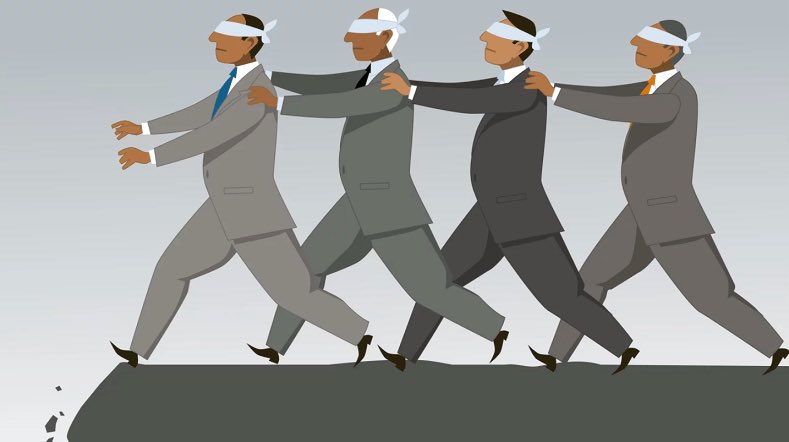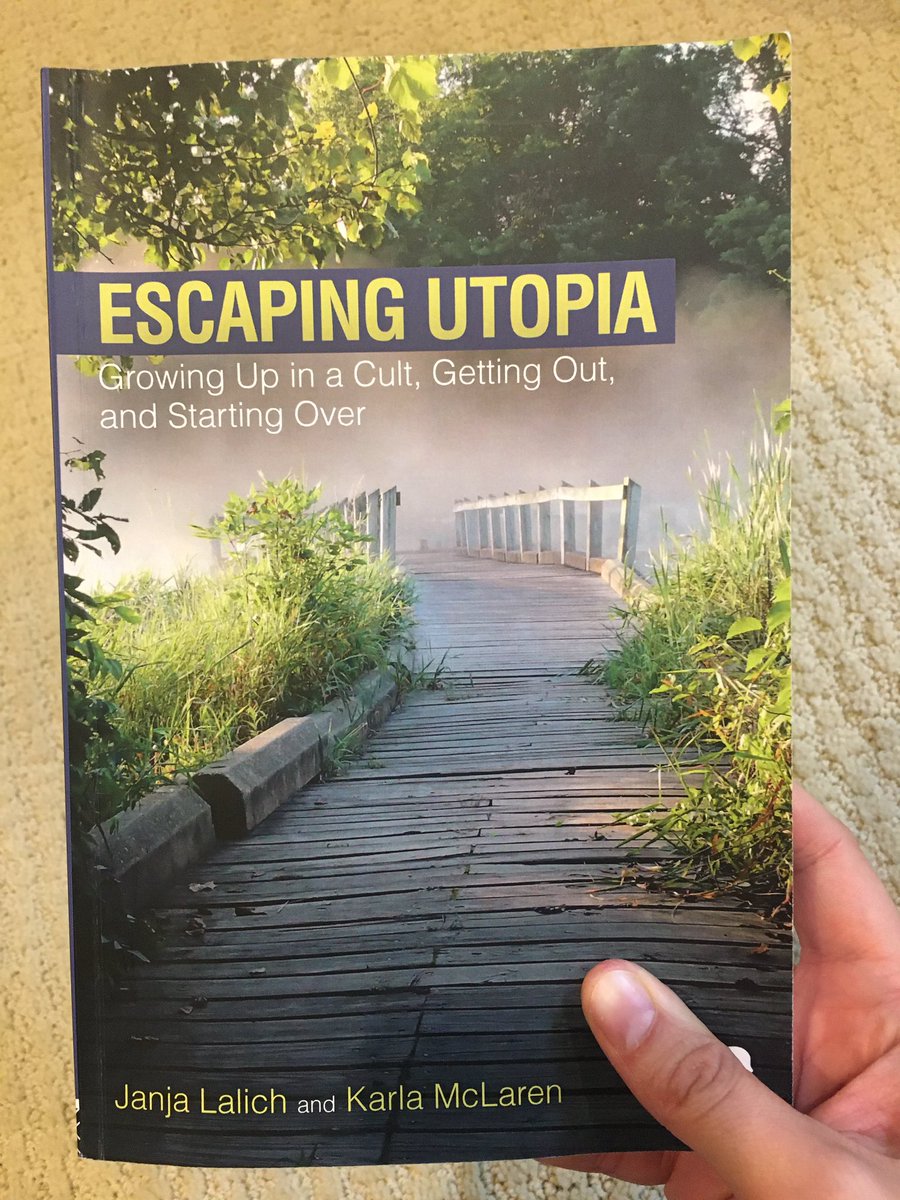Buckle up, folks! 
It is important for every person to understand cults & cultic relationships. (Not all cults are religious btw). So— A cult thread
The first time I called the Mormon Church a cult was on TV in 2014. I used that word very intentionally. I still do today.

It is important for every person to understand cults & cultic relationships. (Not all cults are religious btw). So— A cult thread

The first time I called the Mormon Church a cult was on TV in 2014. I used that word very intentionally. I still do today.
I use the word cult (intentionally) for 2 main reasons:
1) There’s only one way to convey the experience of being a cult survivor— & it's markedly different than "leaving" a regular organization
2) There are many distinct ways cults operate, i.e. behavioral control
1) There’s only one way to convey the experience of being a cult survivor— & it's markedly different than "leaving" a regular organization
2) There are many distinct ways cults operate, i.e. behavioral control
Some academics poo-poo the use of the word “cult” & they are DEAD WRONG 
Some prefer to water it down w the term “closed high-demand groups” or CHDGs, but why water it down? I don’t understand who this benefits.
I don’t understand who this benefits.

Some prefer to water it down w the term “closed high-demand groups” or CHDGs, but why water it down?
 I don’t understand who this benefits.
I don’t understand who this benefits.
It is not stigmatizing to be the victim of a cult— you’re a victim! *Especially* if you were born into the group or brought in by an adult as a child.
The #1 thing people misunderstand about cults is that they actually go after very intelligent, accomplished ppl. It’s not sheep.
The #1 thing people misunderstand about cults is that they actually go after very intelligent, accomplished ppl. It’s not sheep.
Cult leaders go after intelligent, idealistic people— often w resources.
Thinking cult members are dumb sheep just helps people mistakenly believe cult members are different/ inferior to them.
just helps people mistakenly believe cult members are different/ inferior to them.
Spoiler alert: They’re not!
It could happen to you, or someone you love.

Thinking cult members are dumb sheep
 just helps people mistakenly believe cult members are different/ inferior to them.
just helps people mistakenly believe cult members are different/ inferior to them.Spoiler alert: They’re not!
It could happen to you, or someone you love.


Of course, we do need to be careful with the word “cult” to make sure it isn’t just being used to belittle or “other” any group we don’t like or trust (or religion that isn’t our own).
But, the fact remains that cults exist & are very real, very specific kinds of social groups.
But, the fact remains that cults exist & are very real, very specific kinds of social groups.
Cults ARE NOT defined by what the cult leader or its members believe. All religious groups make fantastical claims.
Cults are defined by HOW those beliefs are transmitted, who transmits them & how much FREEDOM the group members have (for example, to disagree/ dissent).
Cults are defined by HOW those beliefs are transmitted, who transmits them & how much FREEDOM the group members have (for example, to disagree/ dissent).
Again— wacky beliefs ARE NOT key to identifying cults.
There all kinds of cults:
— Political cults
— Space/ UFO cults
— Exercise cults
— Corporate cults
— Self-improvement cults
— Martial arts cults
— Nutrition cults
— Multi-level marketing cults
— Philosophical cults
— Wealth cults
— Meditation cults
& of course, religious cults.
— Political cults
— Space/ UFO cults
— Exercise cults
— Corporate cults
— Self-improvement cults
— Martial arts cults
— Nutrition cults
— Multi-level marketing cults
— Philosophical cults
— Wealth cults
— Meditation cults
& of course, religious cults.
Cults, of all kinds, like to feign that they are being persecuted for their beliefs.
What they are actually being held accountable for are their abusive practices, not beliefs.
What they are actually being held accountable for are their abusive practices, not beliefs.
I’ve found the work of @Janja_Lalich to be particularly helpful in my own journey out of a cultic group.
This book is also helpful for loved ones, social services agencies & counseling professionals dealing w cult survivors.
This book is also helpful for loved ones, social services agencies & counseling professionals dealing w cult survivors.
@Janja_Lalich, a cult expert & survivor, identifies 4 features all cults share:
1) Transcendent Belief System
2) Charismatic Authority
3) Systems of Control
4) Systems of Influence
They stifle individuality + critical thinking, require intense obedience & restrict freedom.
1) Transcendent Belief System
2) Charismatic Authority
3) Systems of Control
4) Systems of Influence
They stifle individuality + critical thinking, require intense obedience & restrict freedom.
1) Transcendent Belief System
This can be tricky bc I promised you it’s not abt what they believe!
The important distinction is— It’s not abt WHAT they believe, but the cult’s enforced eradication of ANY behaviors or ideas that challenge the group’s beliefs.
This can be tricky bc I promised you it’s not abt what they believe!
The important distinction is— It’s not abt WHAT they believe, but the cult’s enforced eradication of ANY behaviors or ideas that challenge the group’s beliefs.
The demand for totalizing commitment from the cult often leads to fierce distrust & even hatred of outsiders.
What is wrong is not the belief system— it’s that everyone else is wrong & unworthy unless they become believers *themselves.*
This creates toxic “Us v Them” mentality.
What is wrong is not the belief system— it’s that everyone else is wrong & unworthy unless they become believers *themselves.*
This creates toxic “Us v Them” mentality.
2) Charismatic Authority
This is confusing because cult leaders don’t necessarily have the typical kind of charisma we’d think of, in the common sense of the word.
Cult leaders are often ugly (a la NXIVM’s Kieth Raniere) & awkward. They need/ use manipulation to influence ppl.
This is confusing because cult leaders don’t necessarily have the typical kind of charisma we’d think of, in the common sense of the word.
Cult leaders are often ugly (a la NXIVM’s Kieth Raniere) & awkward. They need/ use manipulation to influence ppl.
Cult leaders/ teams find ways to seduce potential recruits. It often involves finding ppl when they are vulnerable & using powerful emotional manipulation.
I’m ashamed to say— but I know this bc these are techniques I used as a Mormon missionary to recruit people in Spain.
I’m ashamed to say— but I know this bc these are techniques I used as a Mormon missionary to recruit people in Spain.
As Mormon missionaries, we were taught to specifically target people who were vulnerable in order to have more “success.”
For example, people who had recently lost a loved one, people who were lonely, people who recently had a big life transition were more receptive to our msg.
For example, people who had recently lost a loved one, people who were lonely, people who recently had a big life transition were more receptive to our msg.
3) Systems of Control
Every group has social structures that help them organize & distinguish themselves. Fine. In healthy groups these systems of control are non-coercive & tolerant.
In cults, there’s punishment & manipulation in order to compel obedience.
Every group has social structures that help them organize & distinguish themselves. Fine. In healthy groups these systems of control are non-coercive & tolerant.
In cults, there’s punishment & manipulation in order to compel obedience.
In some cults every aspect of life is controlled and complete conformity is demanded.
They control:
— communication (esp w outsiders)
— education
— diet
— clothing/ modesty
— sexual habits
— healthcare decisions
— family planning
— friendships
— free time, etc.
They control:
— communication (esp w outsiders)
— education
— diet
— clothing/ modesty
— sexual habits
— healthcare decisions
— family planning
— friendships
— free time, etc.
Cults often mask behavioral control as part of the belief system… So, people think they are making choices intentionally & willingly because it’s part of what they believe.
This creates a false sense of free will & choice (or as Mormons call it “free agency”).
This creates a false sense of free will & choice (or as Mormons call it “free agency”).
The infuriating thing cults do is have an all out ban  on ANY unapproved behavior while simultaneously verbally promoting free will/ free agency.
on ANY unapproved behavior while simultaneously verbally promoting free will/ free agency.
“You are absolutely a free agent— BUT DO NOT STRAY OR WE WILL SEVERELY PUNISH YOU” messaging can be a real mind fuck.
 on ANY unapproved behavior while simultaneously verbally promoting free will/ free agency.
on ANY unapproved behavior while simultaneously verbally promoting free will/ free agency.“You are absolutely a free agent— BUT DO NOT STRAY OR WE WILL SEVERELY PUNISH YOU” messaging can be a real mind fuck.
4) Systems of Influence
In my experience, THIS is the #1 thing that makes it hard to exit cults.
You realize that they have created a false sense of belonging & your community is actually dependent on staying in line.
If you step out of line— you stand to lose your community.
In my experience, THIS is the #1 thing that makes it hard to exit cults.
You realize that they have created a false sense of belonging & your community is actually dependent on staying in line.
If you step out of line— you stand to lose your community.
Bc cults create impermeable in group/ out group boundaries in order to have control over members— it can lead to self-policing.
Members spy on & peer pressure each other. The work of leaders in policing adherence is done by the entire group & it’s fucking creepy as fuck.
Members spy on & peer pressure each other. The work of leaders in policing adherence is done by the entire group & it’s fucking creepy as fuck.
One of the most troubling after-effects of being in a cult for me is hypocrisy became essential for survival.
In order to survive, I had to pretend to agree w things I didn’t & do things I thought were wrong— just to fit in.
Learning to live authentically can be a bumpy ride.
In order to survive, I had to pretend to agree w things I didn’t & do things I thought were wrong— just to fit in.
Learning to live authentically can be a bumpy ride.
Because of the totalizing nature of most cults— kids born or raised in cults have v different experiences & more severe after-effects than ppl who join as adults & skedaddle.
One of the positive/ negative things was cultivating a sense of stubbornness. In order to change the way my own brain had been molded to make me compliant, I had to be very stubborn & defiant to get out.
I love this quality bc it helped me exit, but I can be too stubborn now
I love this quality bc it helped me exit, but I can be too stubborn now

Leaving a cult is one of the most difficult things a person can do & a lifetime process for many.
One narrator in @Janja_Lalich’s book describes it as a bankruptcy.
Creditors are calling & you’re drowning— you finally get relief— but then you have to start your life ALL over.
One narrator in @Janja_Lalich’s book describes it as a bankruptcy.
Creditors are calling & you’re drowning— you finally get relief— but then you have to start your life ALL over.
I survived a cult’s harshest punishment (excommunication/ banishment) & came out stronger bc of it.
Post traumatic stress is real, but so is post traumatic growth.
To anyone leaving a cult, my advice is: take it slow. Have patience w yourself. Live life w zest!
Post traumatic stress is real, but so is post traumatic growth.
To anyone leaving a cult, my advice is: take it slow. Have patience w yourself. Live life w zest!

You sacrificed a lot (family, friends, career, time, thousands of dollars, social ostracism, etc.) to get where you are.
Make those sacrifices worth it by creating a bold, beautiful, authentic life that’s all your own.
Make those sacrifices worth it by creating a bold, beautiful, authentic life that’s all your own.
To anyone never involved in cultic relationships or groups— if you think only unintelligent people are involved in them, you’re ignorant.
Cult members aren’t wide-eyed fools. They’re people who’ve been under the influence of powerful systems deliberately designed to manipulate.
Cult members aren’t wide-eyed fools. They’re people who’ve been under the influence of powerful systems deliberately designed to manipulate.
People want to think that only unintelligent people would be involved with cults & that THEY would never fall for a Jonestown or Scientology or Mormonism.
Most cult members are relatively normal. It’s threatening for people to be confronted with this reality, but it’s true.
Most cult members are relatively normal. It’s threatening for people to be confronted with this reality, but it’s true.
Stigmatizing outsiders is something cult members do— don’t fall into the trap of doing it back to them.
We ALL need to understand & be able to properly identify cults in order to avoid them, as well as help people escape them w the resources & support they need & deserve.
/fin
We ALL need to understand & be able to properly identify cults in order to avoid them, as well as help people escape them w the resources & support they need & deserve.
/fin

 Read on Twitter
Read on Twitter




